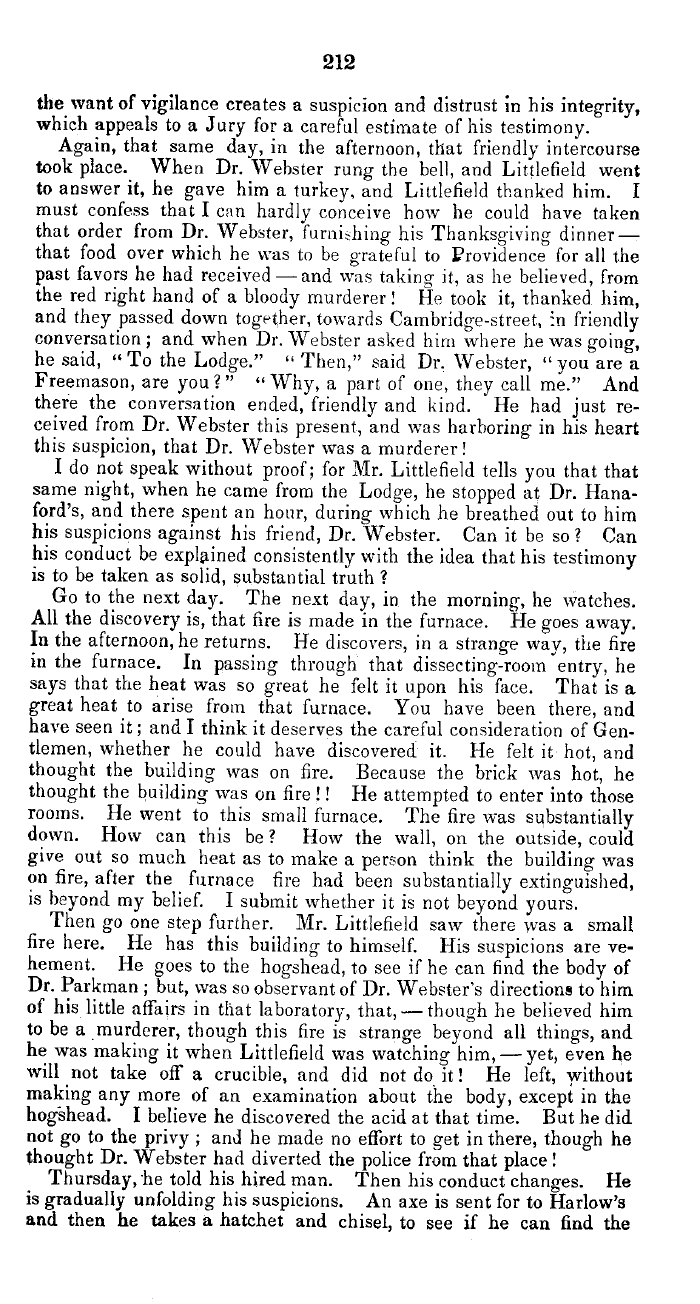|
212
the want of vigilance creates a suspicion and distrust in his integrity,
which appeals to a Jury for a careful estimate of his testimony.
Again, that same day, in the afternoon, that friendly intercourse
took place. When Dr. Webster rung the bell, and Littlefield went
to answer it, he gave him a turkey, and Littlefield thanked him. I
must confess that I can hardly conceive how he could have taken
that order from Dr. Webster, furni,hing his Thanksgiving dinner-
that food over which he was to be grateful to Providence for all the
past favors he had received-and was taking it, as he believed, from
the red right hand of a bloody murderer! He took it, thanked him,
and they passed down together, towards Cambridge-street, _n friendly
conversation; and when Dr. Webster asked him where he was going,
he said, °' To the Lodge." " Then," said Dr. Webster, " you are a
Freemason, are you ? " °' Why, a part of one, they call me." And
there the conversation ended, friendly and kind. He had just re-
ceived from Dr. Webster this present, and was harboring in his heart
this suspicion, that Dr. Webster was a murderer!
I do not speak without proof; for Mr. Littlefield tells you that that
same night, when he came from the Lodge, he stopped at Dr. Hana-
ford's, and there spent an hour, during which he breathed out to him
his suspicions against his friend, Dr. Webster. Can it be so ? Can
his conduct be explained consistently with the idea that his testimony
is to be taken as solid, substantial truth ?
Go to the next day. The next day, in the morning, he watches.
All the discovery is, that fire is made in the furnace. He goes away.
In the afternoon, he returns. He discovers, in a strange way, the fire
in the furnace. In passing through that dissecting-room entry, he
says that the heat was so great he felt it upon his face. That is a
great heat to arise from that furnace. You have been there, and
have seen it; and I think it deserves the careful consideration of Gen-
tlemen, whether he could have discovered it. He felt it hot, and
thought the building was on fire. Because the brick was hot, he
thought the building was on fire ! ! He attempted to enter into those
rooms. He went to this small furnace. The fire was substantially
down. How can this be ? How the wall, on the outside, could
give out so much heat as to make a person think the building was
on fire, after the furnace fire had been substantially extinguished,
is beyond my belief. I submit whether it is not beyond yours.
Then go one step further. Mr. Littlefield saw there vas a small
fire here. He has this building to himself. His suspicions are ve-
hement. He goes to the hogshead, to see if he can find the body of
Dr. Parkman ; but, was so observant of Dr. Webster's directions to him
of his little affairs in that laboratory, that,-though he believed him
to be a murderer, though this fire is strange beyond all things, and
he was making it when Littlefield was watching him,-yet, even he
will not take off a crucible, and did not do it! He left, without
making any more of an examination about the body, excepi in the
hogshead. I believe he discovered the acid at that time. But he did
not go to the privy ; and he made no effort to get in there, though he
thought Dr. Webster had diverted the police from that place!
Thursday, he told his hired man. Then his conduct changes. He
is gradually unfolding his suspicions. An axe is sent for to Harlow's
and then he takes a hatchet and chisel, to see if he can find the
|

